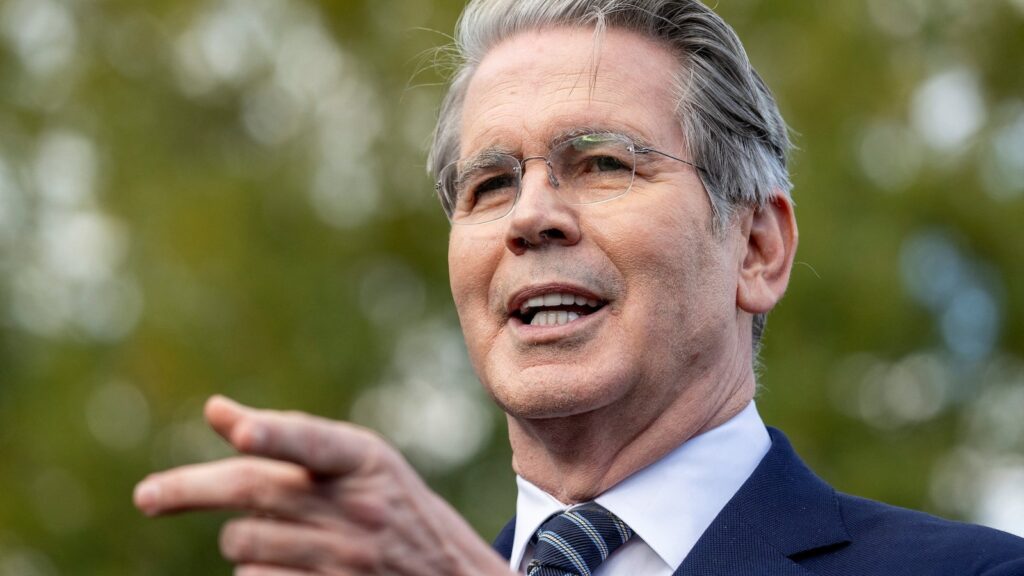Thanks to Trump’s tariff wars, China has essentially stopped buying American soybeans, dealing a significant financial blow to American farmers. China used to purchase 54 percent of the U.S. soy crop, but since the Trump administration imposed punishing tariffs on the nation, China has all but ceased buying American soy, getting their soy from Brazil instead.
Confronted with this fact by host Martha Raddatz on ABC’s This Week, Trump Treasury Secretary Scott Bessent — a former hedge fund manager who boasts a net worth of more than $500 million and who rents $25 million in farmland out to soybean farmers — tried to paint himself as the common farmer who understands American farmers’ “pain.”
“China has been boycotting American soybeans and American farmers have really suffered. Do you see a real light at the end of the tunnel there, they may allow soybeans again?” Raddatz asked Bessent on Sunday.
“Well, Martha, in case you don’t know it, I’m actually a soybean farmer. So, I have felt this pain, too,” Bessent said. But Bessent isn’t a farmer; he’s a landlord who rents to real farmers.
Bessent added that in ceasing to buy American soybeans, China is attempting to hurt farmers, who he said are “amongst President Trump’s biggest supporters.”
“I think we have addressed the farmer’s concerns, and I’m not going to get ahead of the president, but I believe when the announcement of the deal with China is made public, that our soybean farmers will feel very good about what’s going on both for this season and the coming seasons for several years,” Bessent said.
Bessent loves to pull the “I’m a farmer” line out of his pocket when confronted with the tariffs’ impact on American farms — an attempt to humanize himself and pretend he can relate to farmers who are suddenly sitting on a surplus of crops that won’t sell, thanks to the president Bessent serves.
“You may or may not know, I am a farmer,” Bessent said in May when asked about tariffs.
In case you’re wondering whether it’s a massive conflict of interest having a treasury secretary who is vested in the crop he is negotiating the sale of with China, you’d be right, according to government ethics experts.
Bessent, a former hedge fund manager who has worked in finance his entire adult life, owns up to $25 million in North Dakota farmland that earns him as much as $1 million per year in rental income, financial disclosure forms show. During his confirmation hearings, Bessent vowed that he would divest from these assets if confirmed. But here we are coming up on a year later, and Bessent is still holding interest in several assets, including his farmland.
“I initiated the process to find buyers for these private holdings, but all three assets are privately held investments for which there is no liquid market for their resale,” Bessent wrote in a June letter to the Treasury ethics office regarding the assets he has not yet divested, including the farmland as well as a flavored water company and clinical trial drug company.
Bessent claims he has divested 96 percent of his assets he is required to and says he is working to divest fully by Dec. 15.
Bessent’s holdings raise several concerns, including with ethics officials in the Treasury Department, who wrote in a letter to Republican Senate Finance Committee Chair Mike Crapo: “it is [Bessent’s] personal responsibility to avoid taking any action that could create a real or apparent conflict of interest with regard to his holdings.”
Bessent’s refusal to divest fully is just one example of flouted ethics that define this administration.
As Sen. Ron Wyden, who serves as the Democratic ranking member on the Finance Committee, said to The New York Times, “If these guys gave a whit about clearing the stink of corruption off this administration, then you wouldn’t have the Treasury secretary picking and choosing which ethics requirements to follow and which to blow off.”

